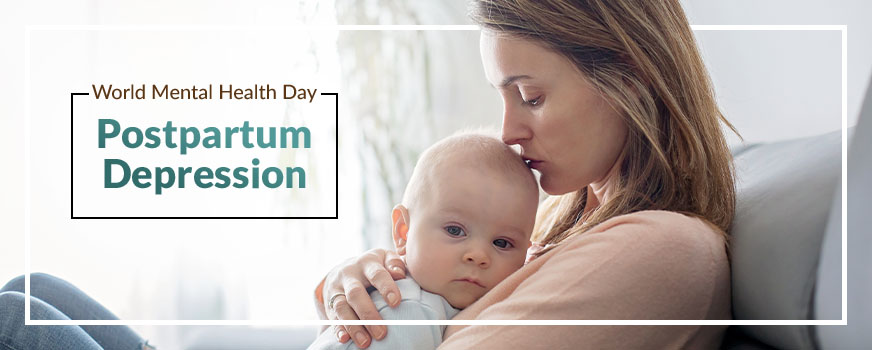
According to the Office on Women’s Health, postpartum depression can affect 1 in 9 new mothers. Because this mental health condition is so common, it’s important to talk about the condition itself, examine some of the most common symptoms, and share ways that women (and their families) can get help if they’re struggling with postpartum depression.
What is Postpartum Depression?
Postpartum depression (PPD) is “a serious mental illness that involves the brain and affects your behavior and physical health.” Like other forms of depression, mothers suffering from postpartum depression are plagued by sad, flat feelings that don’t go away. In more extreme cases, these symptoms can interfere with day-to-day life and responsibilities.
While it’s common to have a few days or weeks of the typical “baby blues” due to childbirth, new responsibilities, anxiety, and lack of sleep, PPD is a more extreme case and a mental health condition. Like other mental health disorders, there’s no “cause” for postpartum depression, but the hormonal changes during pregnancy and childbirth might trigger it in some women. The rapid change in estrogen and progesterone levels during and after pregnancy may lead to depression, according to a report published in the US National Library of Medicine.
Another factor in the development of PPD could be the drop in thyroid hormones after giving birth. The thyroid is a small gland in the neck that helps a woman’s body regulate how it uses and stores energy from food. Low levels of thyroid hormones can cause symptoms of depression.
PPD can start during the first few weeks after childbirth or up to a year later. But more importantly, the symptoms of postpartum depression can last for years after giving birth if not treated properly. Like other mental health conditions, treatment is key to getting help and feeling better. Those with PPD should seek medical attention rather than try to wait it out. According to Medical News Today, symptoms of PPD decrease over time, but 38% of women with PPD experienced chronic symptoms and 30% were still depressed up to 3 years after giving birth.
Because of this, it’s important to recognize the signs and symptoms of postpartum depression and seek out appropriate treatment as soon as possible. Let’s look at some of the most common symptoms of PPD.
 Postpartum Depression Symptoms
Postpartum Depression Symptoms
Knowing the symptoms of PPD is the first step in getting yourself or someone you love the help they need. Some of the most common symptoms include:
- Depressed mood or severe mood swings
- Excessive crying
- Difficulty bonding with your baby
- Withdrawing from family and friends
- Loss of appetite or eating much more than usual
- Inability to sleep (insomnia) or sleeping too much
- Overwhelming fatigue or loss of energy
- Reduced interest and pleasure in activities you used to enjoy
- Intense irritability and anger
- Fear that you’re not a good mother
- Hopelessness
- Feelings of worthlessness, shame, guilt or inadequacy
- Diminished ability to think clearly, concentrate or make decisions
- Restlessness
- Severe anxiety and panic attacks
- Thoughts of harming yourself or your baby
- Recurring thoughts of death or suicide
PPD doesn’t just affect new mothers, either. New fathers can experience postpartum depression as well. They may have increased anxiety, feel sad or fatigued, feel overwhelmed, or experience changes in their eating or sleeping patterns. PPD in fathers is sometimes referred to as paternal postpartum depression. PPD can also affect both first-time parents and parents with children already.
If you or someone you love is experiencing the above symptoms for over 2 weeks, if their symptoms are getting worse, or if their symptoms are making it hard to take care of themselves or their new baby, call your doctor as soon as possible. You can also call the National Helpline, a 24/7 confidential service for individuals and family members facing mental disorders.
 Treatment for Postpartum Depression
Treatment for Postpartum Depression
As mentioned, postpartum depression isn’t a condition that you should wait out. If you or someone you love is experiencing the above symptoms, meet with a mental health professional for a diagnosis.
From there, a mental health professional might prescribe antidepressants or psychotherapy, which is a form of talk therapy. If your doctor determines that your PPD is caused by an underlying issue, such as hormone imbalances or an underactive thyroid, they can treat those conditions or refer you to a specialist.
Other Tips for Coping with PPD
Although postpartum depression should be treated by a medical professional, there are some things you can do at home either while you wait for your appointment or in conjunction with therapy or medications. Here are a few ways to help boost your energy and mood:
- Rest as much as you can. You’ve likely heard the suggestion to “sleep when the baby sleeps” and although this might not be practical for all couples, you should still find ways to get some extra rest during the day and night.
- Don’t be afraid to ask loved ones, including spouses, friends, and family for help. Don’t feel like you need to do everything on your own.
- Make time to take care of yourself. Whether that’s taking a long bubble bath, going out to dinner with some friends, or hitting the gym, some “me time” will help boost your mood.
- Join a support group and don’t be afraid to talk about PPD. World Mental Health Day encourages us to recognize mental health disorders and we should all work together to lessen the stigma society has about mental health conditions. The more we talk about PPD, the more helpful information we’ll be able to share.
- Don’t make any major life decisions right after the baby is born. Major life changes, like moving, getting married, or starting a new job, can exacerbate an already shaky mental condition. If you can’t avoid upcoming life changes, make sure you arrange support and help ahead of time and transition slowly.
This World Health Day, don’t shy away from talking about postpartum depression and other mental health disorders. The more we can talk about these conditions and support each other, the faster we can move forward and advance today’s treatments, research, and support options.
 Postpartum Depression Symptoms
Postpartum Depression Symptoms Treatment for Postpartum Depression
Treatment for Postpartum Depression


